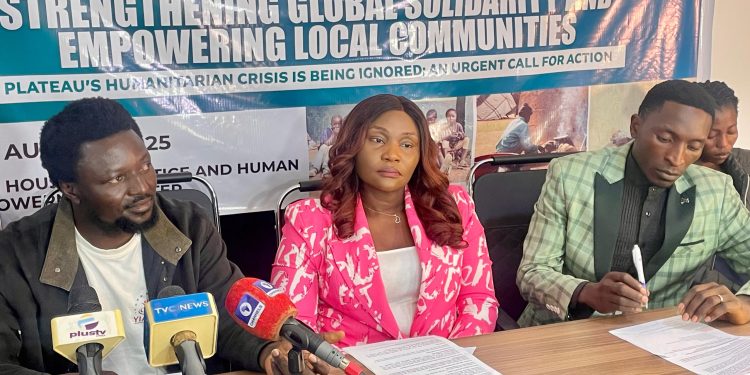Jos, Plateau State – August 19, 2025:
The Safe House for Justice and Human Empowerment Centre has sounded a strong alarm over the worsening humanitarian situation in Plateau State, declaring that the crisis has been dangerously neglected despite mounting casualties and displacement.
Speaking at a press briefing to mark World Humanitarian Day 2025 in Jos, the Centre’s Executive and Campaign Director, Barr. Edith Mankiling Gumut, said Plateau has become the epicenter of “a protracted humanitarian catastrophe” marked by mass killings, forced displacement, and the exploitation of women and children.
“We are not here to commemorate, but to cry out,” Gumut declared. “Plateau’s suffering must not remain hidden. The world must act before this crisis swallows what is left of our humanity.”
According to the Centre, 64 communities across Plateau have been displaced, creating ghost towns and leaving families without shelter, food, or safety. The situation has forced many to seek refuge in churches, schools, and makeshift camps, where basic necessities are scarce. Women and children, who make up the majority of the displaced, face extreme risks, including sexual exploitation, gender-based violence, and child trafficking.
A particularly grim report highlighted children being trafficked to other states and forced into domestic labor, with some women and girls resorting to “sex for survival.” The Ministry of Women Affairs recently rescued over 300 trafficked children from Bassa Local Government, underscoring the scale of exploitation.
The organization cited recent attacks in Bindi, Bassa, Riyom, Barkin Ladi, and Mangu, where villages were razed, dozens killed, and thousands uprooted. In July 2025 alone, at least 27 people were buried in mass graves in Bindi, while 24,681 persons were displaced in a single wave of attacks. Humanitarian monitors also reported a 19% increase in displaced persons since late 2023, bringing the total to over 1.3 million IDPs in Plateau State.
One grieving mother shared her plight: “I lost my husband to an attack. Now I must choose between feeding my children once a day or sending them to beg. No mother should face such a choice.”
While acknowledging recent interventions—including the ₦1 billion donation by Nigeria’s First Lady, Senator Oluremi Tinubu, and support from humanitarian agencies such as UNICEF, WHO, GIZ, NRC, and Search for Common Ground—the Centre stressed that such efforts “are but drops in an ocean of need.” Funding cuts, coupled with climate-related disasters, have worsened the crisis.
The Safe House issued a threefold call to action:
1. To donor agencies and philanthropists: Support must go beyond emergency aid and focus on long-term peacebuilding, trauma healing, and livelihood restoration.
2. To government authorities: Security forces must be deployed proactively, not reactively. A comprehensive strategy involving intelligence gathering, rapid response, and community policing is urgently needed.
3. To individuals: Citizens are urged not to look away. “Your donations, no matter how small, can be a lifeline,” Gumut appealed.
Concluding, the Centre warned that Plateau risks becoming a “forgotten crisis” if urgent and sustained interventions are not implemented.
“The humanitarian crisis in Plateau is not just a statistic. It gnaws at the very soul of our people,” Gumut said. “We call on Nigerians, policymakers, and the global community—stand with Plateau, and let humanity prevail.”
For media inquiries, contact:
Nennyinka Biska, Communications and Media Manager
Safe House for Justice and Human Empowerment Centre
Tel: 08066647731












